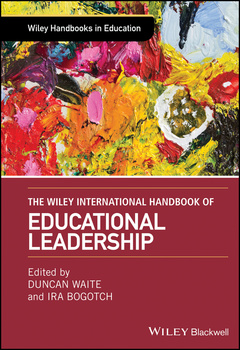The Wiley International Handbook of Educational Leadership Wiley Handbooks in Education Series
Coordonnateurs : Waite Duncan, Bogotch Ira

A provocative and authoritative compendium of writings on leadership in education from distinguished scholar-educators worldwide.
What is educational leadership? What are some of the trends, questions, and social forces most relevant to the current state of education? What are the possible futures of education, and what can educational leadership contribute to these futures? To address these questions, and more, editors Duncan Waite and Ira Bogotch asked distinguished international thought leaders on education to share their insights, observations, and research findings on the nature of education and educational leadership in the global village.
The Wiley International Handbook of Educational Leadership brings together contributions from authors in twenty-one countries, spanning six continents. Topics examined include leadership and aesthetics, creativity, eco?justice, advocacy, Big Data and technology, neoliberalism, emerging philosophies and theories, critical democracy, gender and radical feminism, political economies, emotions, postcolonialism, and new directions in higher education.
A must-read for teachers, researchers, scholars, and policy makers, this Handbook:
- Champions radical pluralism over consensus and pseudoscientific or political solutions to problems in education
- Embraces social, economic, and political relevance alongside the traditions of careful and systematic rigor
- Challenges traditional epistemological, cultural, and methodological concepts of education and educational leadership
- Explores the field?s historical antecedents and ways in which leadership can transcend the narrow disciplinary and bureaucratic constraints imposed by current research designs and methods
- Advances radically new possibilities for remaking educational leadership research and educational institutions
Notes on Contributors ix
Working Within Radical Pluralism: Reconstructing Educational Leadership 1
Ira Bogotch and Duncan Waite
1 Educational Leadership for What? An Educational Examination 15
Gert Biesta
2 The Question of Creativity for the Field of Educational Leadership 29
Susan Field Waite and Kirsten Robbins
3 Educational Leadership and Emotion 45
Gabriele Lakomski and Colin W. Evers
4 Leading With Consistency: How the Ends Don’t Always Justify the Means (and Vice Versa) 63
Andy Hargreaves and Rebecca Lowenhaupt
5 Rethinking Gender and Socially Just Leadership in the Sociospatialized Context(s) of Global Edu]Capitalism 79
Jill Blackmore
6 Politics, Activism, and Leadership for Social Justice in Education 103
James Ryan and Katie Higginbottom
7 From “Data]Driven” to “Democracy]Driven” Educational Leadership: Navigating Market Bureaucracy and New Technology in a Post]Fordist Era 125
Kenneth J. Saltman and Alexander J. Means
8 Educational Leadership and Environmental Justice in a Climate]Challenged World 139
John Hardman
9 Resisting and Reclaiming the Global Discourse of Leadership: From Entrepreneurial to Advocacy Leadership 157
Gary L. Anderson and Andrea López
10 The Political Economy of Leadership 175
Peter Gronn, Anna Vignoles, and Sonia Ilie
11 Freedom to What Ends?— School Autonomy in Neoliberal Times 193
Richard Niesche and Pat Thomson
12 Higher Education Leadership in Universities, Colleges, and Technical Schools Around the World 207
Edward P. St. John, Cliona Hannon, and Wang Chen
13 Educational Leadership for Teaching and Learning 227
Sally J. Zepeda, Oksana Parylo, and Hans W. Klar
14 Leading Schools Down Under: Where are the Real Decisions Made? 253
Tony Townsend, Cathy Wylie, and Jane Wilkinson
15 Administrative Matters for African Educational Leaders: Illustrations from Women Secondary School Administrators in Tanzania and Ghana 271
Beverly Lindsay, Susanna Kofie, and Joyce G. Mbepera
16 Privatizing Leadership in Education in England: The Multiple Meanings of School Principal Agency 295
Steven J. Courtney and Helen M. Gunter
17 From Welfarism to Neo]Liberalism: Conceptualizing the Diversity of Leadership Models in Europe 311
David Hall, Jorunn Møller, Michael Schratz, and Roberto Serpieri
18 The Importance of Leaders’ Discursive Positioning in Neocolonial Education Reform Aimed at Closing the Disparities for Indigenous Peoples 335
Mere Berryman and Dawn Lawrence
19 The Characteristics of Educational Leadership in the Middle East: A Comparative Analysis of Three Nation]States 355
Khalid Arar, Selahattin Turan, Maysaa Barakat, and Izhar Oplatka
20 Asian Geographies of Educational Leadership 375
Darren A. Bryant, Allan Walker, and Qian Haiyan
21 Managing to Lead? Contemporary Perspectives on Principals’ Practices in Russia 397
Alma Harris, Anatoly Kasprzhak, Michelle Jones, and Natalia Isaeva
22 Advances and Challenges of Educational Leadership in Latin America 415
Joaquín Gairín Sallán, Rosa María Tafur Puente, and María Inés Vázquez Clavera
23 Contexts of Canadian Educational Leadership 433
Robert E. White and Karyn Cooper
24 US Contexts of/for Educational Leadership 453
Peter Demerath and Karen Seashore Louis
Index 471
Duncan Waite, PhD is a professor in the Education and Community Leadership Program and the School Improvement Doctoral Program at Texas State University, USA. He is also editor and founder of the International Journal of Leadership in Education.
Ira Bogotch, PhD is a professor of educational leadership and research methodology and Coordinator of the School Leadership Program at Florida Atlantic University, USA. He is also Adjunct Professor at the Griffith University Institute for Educational Research, Australia.
Date de parution : 04-2017
Ouvrage de 512 p.
16.3x24.6 cm
Thème de The Wiley International Handbook of Educational Leadership :
Mots-clés :
education leadership; leadership in education; what is leadership in education; global perspectives on education; pluralism in education; sociopolitical landscape of education; international trends in education; latest thinking on education; post-colonial education; educational leadership challenges; educational leadership in the us; educational leadership in canada; educational leadership in east asia; educational leadership in australia; educational leadership in latin america; educational leadership in africa; educational leadership in europe; educational leadership in the middle east; neocolonial educational leadership; neo-liberalism and education; feminism in education; educational leadership for teaching; educational leadership for learning; higher education leadership; public education leadership; public education and neo-liberalism; history of public education; philosophy of education



